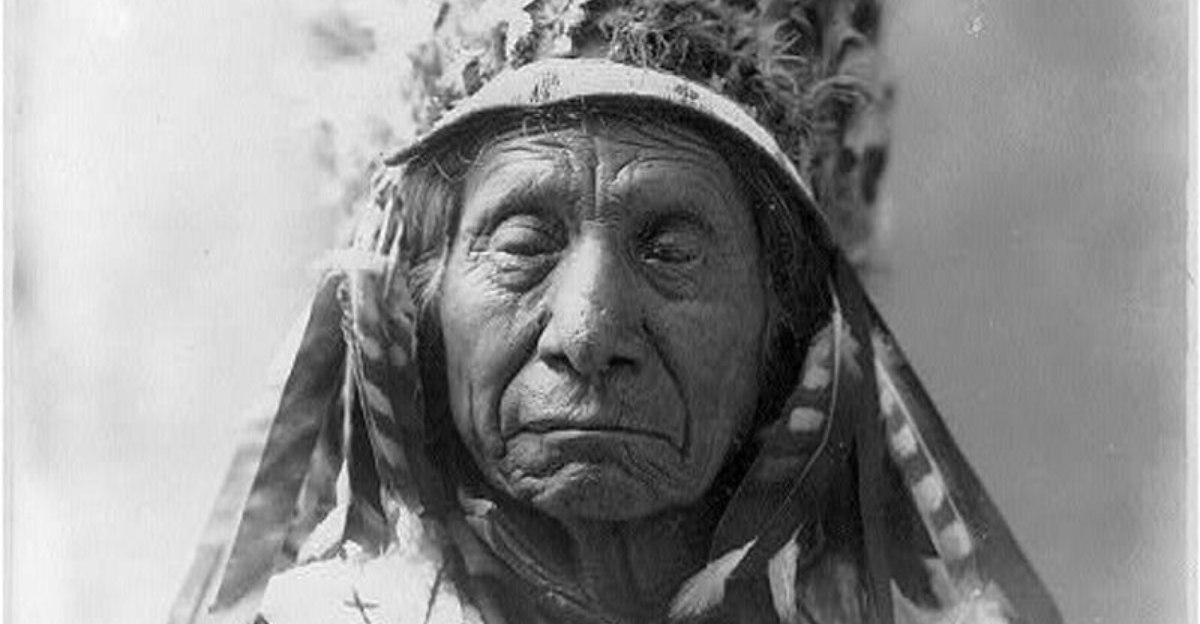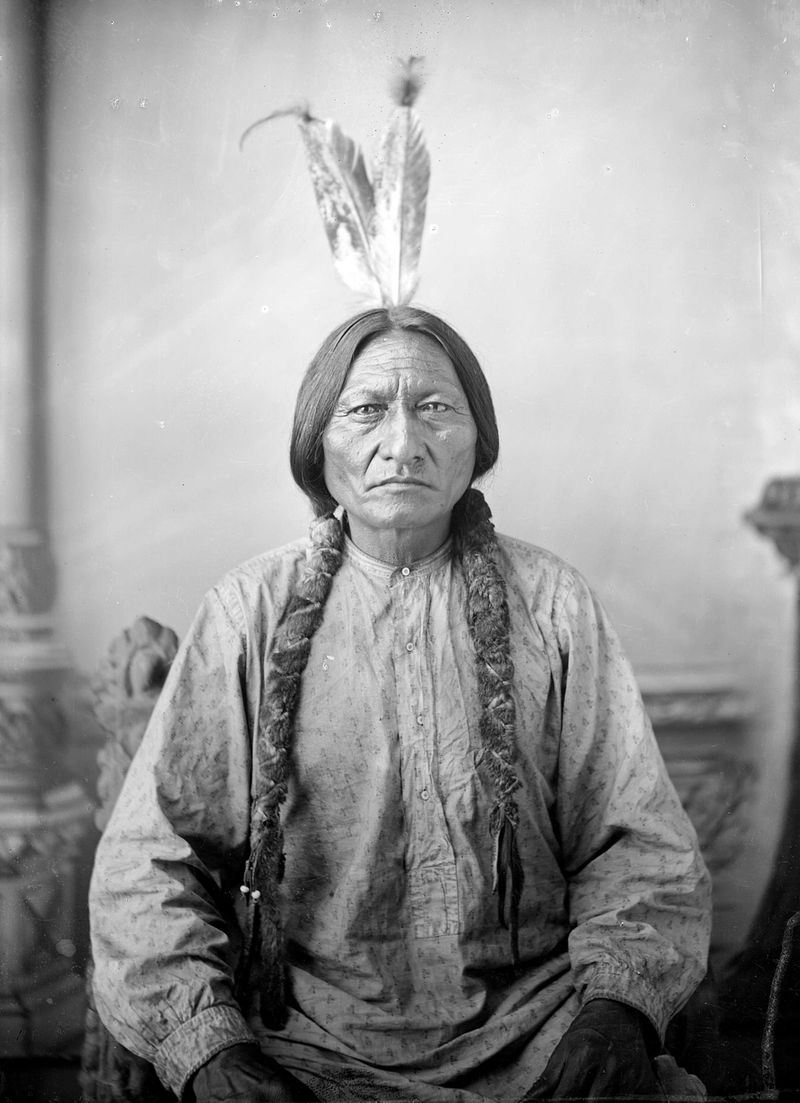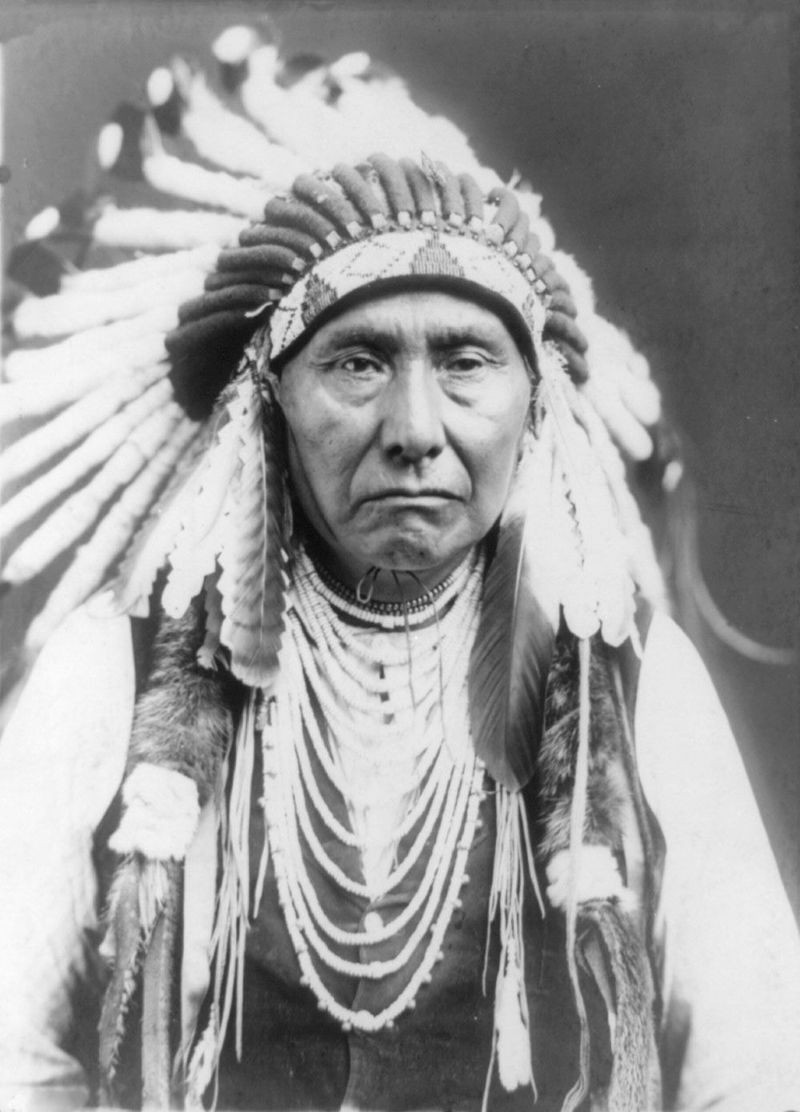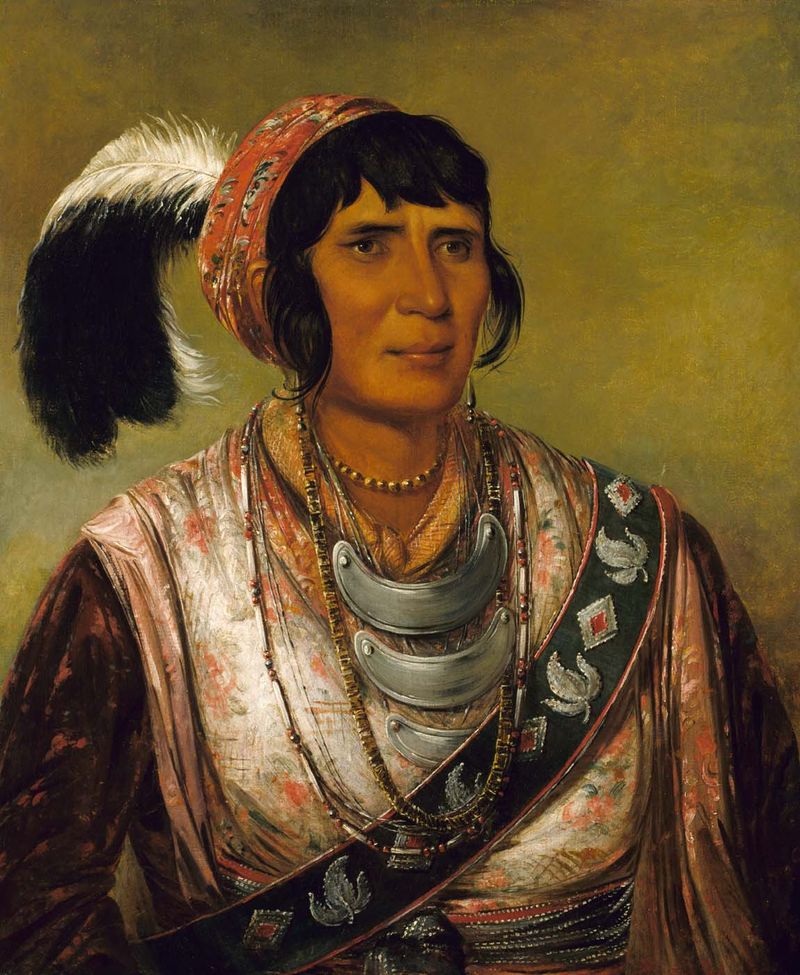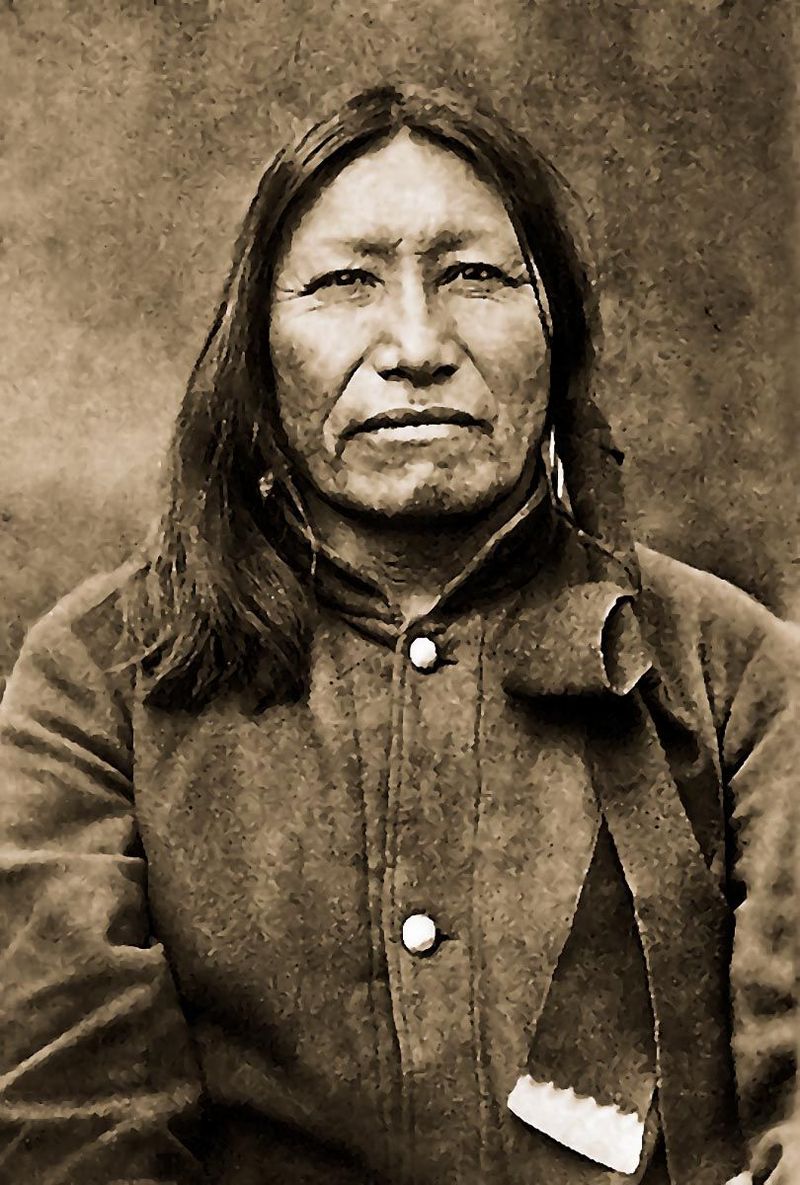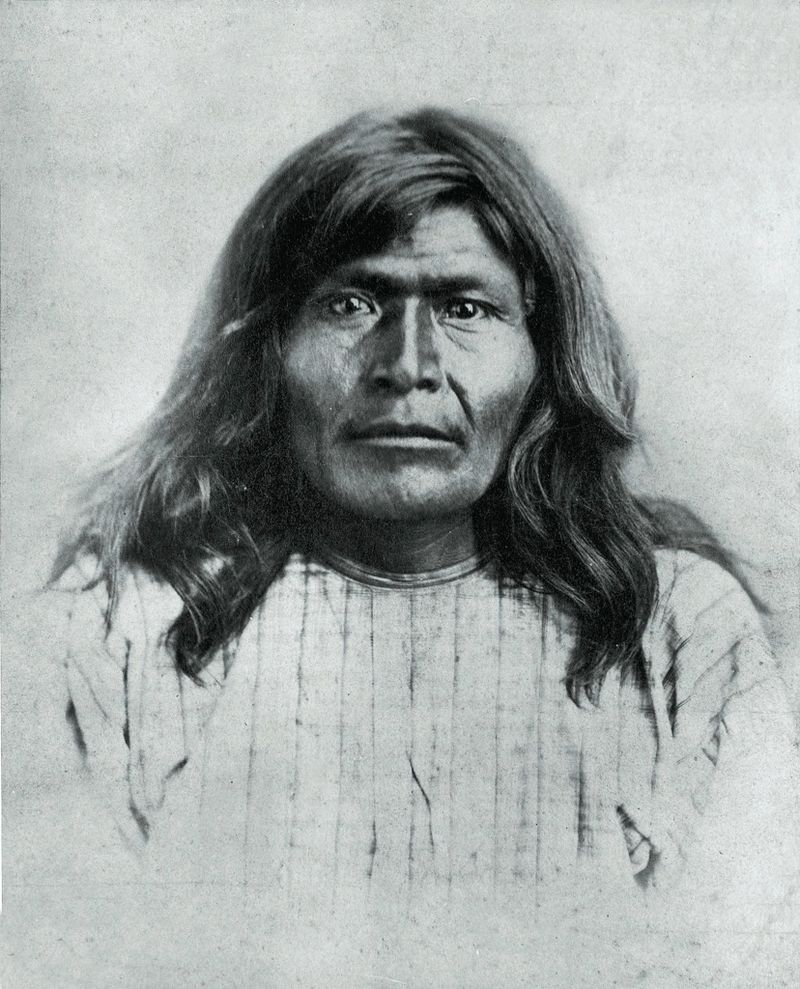Explore the inspiring stories of 20 Native American leaders who stood resiliently against empires. Their courage and strategic brilliance in defending their people’s lands and ways of life have left a lasting legacy.
From visionary leaders like Tecumseh to fierce warriors such as Crazy Horse, each of these individuals played a pivotal role in shaping history through their defiance and determination.
1. Sitting Bull (Hunkpapa Lakota)
Sitting Bull was a revered Hunkpapa Lakota leader known for his spiritual influence and military prowess. He united his people against U.S. expansion, famously playing a pivotal role in the Battle of the Little Bighorn.
His strategic acumen and deep commitment to his people’s sovereignty made him a legendary figure. Sitting Bull’s leadership went beyond the battlefield, as he was a spiritual guide who inspired unity and resistance among the Lakota.
His courage and wisdom in the face of overwhelming odds continue to inspire generations today. His legacy is a testament to resilience and the fight for cultural preservation.
2. Crazy Horse (Oglala Lakota)
Crazy Horse was an iconic Oglala Lakota warrior renowned for his tactical brilliance in battle. Known for his fearless leadership, he played a crucial role in key conflicts like the Battle of the Little Bighorn.
His commitment to preserving the Lakota way of life was unwavering. Crazy Horse’s legacy is marked by his humility and dedication to his people.
Despite being a formidable warrior, he remained a humble leader who sought no personal glory. His life and actions continue to symbolize the indefatigable spirit of resistance against oppression.
3. Geronimo (Apache)
Geronimo was a tenacious Apache leader known for his fierce guerrilla warfare tactics. His unyielding spirit and strategic brilliance challenged both Mexican and American forces, earning him a legendary status.
Under Geronimo’s leadership, the Apache resisted colonization with remarkable persistence. His efforts to protect his people and land made him a symbol of Native American resistance.
Geronimo’s legacy endures as a testament to courage and determination, inspiring future generations to stand firm in the face of adversity.
4. Chief Joseph (Nez Perce)
Chief Joseph led the Nez Perce on a remarkable and dignified retreat to avoid forced removal by U.S. forces. Known for his eloquence, he famously declared, “I will fight no more forever,” symbolizing his desire for peace.
His leadership during the retreat highlighted his strategic acumen and deep care for his people’s welfare.
Chief Joseph’s efforts to seek peaceful solutions, even in dire circumstances, demonstrated his wisdom and compassion. His legacy remains a powerful reminder of the struggle for justice and the pursuit of peace.
5. Tecumseh (Shawnee)
Tecumseh was a visionary Shawnee leader who sought to unite various tribes against American encroachment. His efforts to forge a pan-tribal confederacy challenged imperial ambitions, making him a key figure in Native American resistance.
His charismatic leadership and strategic foresight inspired unity among diverse tribes, aiming to halt the loss of their lands.
Tecumseh’s vision extended beyond mere survival, symbolizing hope and collective strength. His legacy continues to inspire movements for indigenous unity and cultural preservation.
6. Black Hawk (Sauk)
Black Hawk was a formidable leader of the Sauk tribe, known for his courage and resistance during the Black Hawk War. His leadership symbolized indigenous resilience in the Midwest against U.S. expansion.
Despite facing overwhelming odds, Black Hawk’s determination to protect his people’s land and way of life made him an enduring symbol of defiance. His legacy is one of courage and resistance against oppressive forces.
Black Hawk’s story remains a powerful testament to the enduring fight for justice and cultural identity.
7. Red Cloud (Oglala Lakota)
Red Cloud was a brilliant Oglala Lakota strategist known for leading his people in Red Cloud’s War. His strategic acumen forced the U.S. to temporarily abandon its forts along the Bozeman Trail.
His leadership not only secured a significant victory but also symbolized the strength and resilience of the Lakota people.
Red Cloud’s commitment to his people’s sovereignty and way of life remains a vital part of his legacy. His story continues to inspire those fighting for indigenous rights and justice.
8. Osceola (Seminole)
Osceola was a charismatic Seminole leader who fiercely resisted U.S. military forces during the Second Seminole War. His leadership united Seminole warriors to defend their land and freedom against overwhelming odds.
Osceola’s defiance and tactical brilliance made him a significant figure in Native American resistance history. His commitment to his people’s rights and way of life remains a powerful symbol of resistance.
His legacy endures as an inspiration for those who stand against oppression and fight for justice.
9. Pontiac (Ottawa)
Pontiac was an influential Ottawa leader who orchestrated Pontiac’s Rebellion. By rallying multiple tribes in the Great Lakes region, he challenged British colonial policies and sought to protect indigenous lands.
His leadership during the rebellion highlighted his strategic brilliance and his ability to unite diverse groups for a common cause. Pontiac’s efforts to resist colonization symbolize courage and determination.
His legacy continues to inspire those who fight for indigenous rights and the protection of their lands.
10. Massasoit (Wampanoag)
Massasoit was a wise Wampanoag leader known for his diplomatic skills in securing peace treaties with early Pilgrim settlers. His efforts to navigate the pressures of European colonization were instrumental in protecting his people’s lands.
Through diplomacy and strategic alliances, Massasoit maintained peaceful relations while safeguarding Wampanoag interests.
His leadership exemplifies the power of diplomacy in ensuring cultural survival. His legacy is a testament to the importance of peace and cooperation in the face of encroaching forces.
11. Cochise (Chiricahua Apache)
Cochise was a formidable Chiricahua Apache leader renowned for his resistance against U.S. military incursions. His leadership preserved Apache independence for decades, making him a symbol of resilience.
Cochise’s tactical brilliance and commitment to his people’s sovereignty were key to his success in resisting colonization. His legacy continues to inspire those who fight for indigenous rights and freedom.
Cochise’s story is a powerful reminder of the enduring struggle for justice and cultural preservation.
12. Spotted Tail (Brulé Lakota)
Spotted Tail was a respected Brulé Lakota chief known for his leadership in treaty negotiations and battles. He was instrumental in defending Lakota lands through both strength and diplomacy.
His balanced approach to leadership combined strategic prowess with negotiation skills, ensuring his people’s interests were protected. Spotted Tail’s legacy is one of strength, wisdom, and resilience.
His leadership serves as an enduring example of the power of diplomacy in advancing indigenous rights and sovereignty.
13. Sequoyah (Cherokee)
Sequoyah was a visionary Cherokee leader known for creating the Cherokee syllabary. His innovative contributions preserved Cherokee language and culture, empowering his people to resist cultural assimilation.
His efforts to promote literacy among the Cherokee bolstered their cultural identity and resistance to external pressures.
Sequoyah’s legacy is one of empowerment and resilience. His story continues to inspire those who work to preserve indigenous languages and cultural heritage.
14. Tenskwatawa (The Prophet) (Shawnee)
Tenskwatawa, known as The Prophet, was a spiritual Shawnee leader who galvanized tribes to resist American encroachment. His revival movement complemented Tecumseh’s military efforts with inspirational vision.
Through his teachings, Tenskwatawa inspired unity and resistance among diverse tribes. His spiritual leadership played a vital role in fostering a sense of identity and purpose.
His legacy is a testament to the power of spiritual and cultural revival in the face of adversity.
15. Chief Seattle (Duwamish/Suquamish)
Chief Seattle was a renowned Duwamish/Suquamish leader known for his eloquence and environmental wisdom. He advocated for Native rights and sustainable coexistence in the face of colonization.
His speeches emphasized the interconnectedness of all living things, inspiring generations to value environmental stewardship. Chief Seattle’s legacy is one of wisdom and advocacy for indigenous rights.
His vision for harmony with nature continues to resonate with those who seek a sustainable future.
16. Wilma Mankiller (Cherokee Nation)
Wilma Mankiller was the first female chief of the Cherokee Nation, known for modernizing tribal governance and fiercely defending Cherokee sovereignty. Her leadership marked a transformative era for the Cherokee people.
Under her guidance, the Cherokee Nation saw significant advancements in healthcare, education, and economic development.
Mankiller’s legacy is one of empowerment and progress. Her story continues to inspire women and indigenous leaders in their pursuit of equality and justice.
17. Lozen (Apache)
Lozen was a gifted Apache warrior and prophetess known for her remarkable skill and insight in battle. She fought alongside her people, symbolizing the resilience of Apache women.
Her leadership and bravery in the face of adversity made her an enduring symbol of strength and courage.
Lozen’s legacy continues to inspire those who fight for justice and equality. Her story is a testament to the power of women in resistance movements and the quest for freedom.
18. Chief Ouray (Ute)
Chief Ouray was a diplomatic Ute leader admired for his integrity and courage. He negotiated fairer treaties while actively defending Ute lands against encroachment.
His leadership was characterized by a commitment to peace and justice, balancing diplomacy with firm resistance.
Ouray’s legacy is one of wisdom and strength. His contributions continue to inspire those who seek peaceful solutions in the face of adversity.
19. Nanyehi (Nancy Ward) (Cherokee)
Nanyehi, also known as Nancy Ward, was revered as a Beloved Woman in Cherokee society. She played a critical role in balancing war and peace, advocating for her people’s welfare.
Her leadership was marked by wisdom and compassion, ensuring her people’s interests were protected. Nanyehi’s legacy is one of empowerment and resilience. Her story continues to inspire those who work towards peace and justice in their communities.
20. Red Jacket (Seneca)
Red Jacket was a master orator and leader of the Seneca people. Known for his eloquent speeches, he fiercely resisted European colonization and defended the rights and traditions of the Seneca.
His ability to articulate the importance of cultural preservation made him a powerful advocate for his people. Red Jacket’s legacy is one of strength and eloquence. His story continues to inspire those who fight for indigenous rights and cultural integrity.
